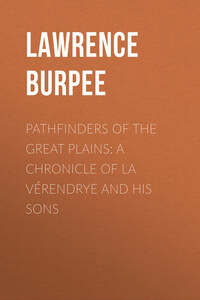Canada has had many brave sons, but none braver than Pierre Gaultier de La Vérendrye, who gave all that he had, including his life, for the glory and welfare of his country. La Vérendrye was born in the quaint little town of Three Rivers, on the St Lawrence, on November 17, 1685. His father was governor of the district of which Three Rivers was the capital; his mother was a daughter of Pierre Boucher, a former governor of the same district. In those days, when Canada was still a French colony, both Three Rivers and Montreal had their own governors, while the whole colony was under the authority of the governor-general, who lived at Quebec.
At that time Three Rivers was a more important place than it is to-day. Next to Quebec and Montreal, it was the largest town in Canada. If we could see it as it was in the days of La Vérendrye, we should find it very different from the towns we know. It was surrounded by a strong wall and protected with cannon. The town had always a garrison of regular soldiers, and this garrison was supported in times of necessity by every man and boy in Three Rivers. Those who lived in the neighbourhood were also liable to be called upon for the service of defence. In those days, when the dreaded Iroquois might at any moment swoop down upon the little settlement, every man kept his gun within reach, and every man knew how to use it. When the alarm was given, men, women, and children swarmed into Three Rivers, and the town became a secure fortress; for the Indians, ready enough to ambush small parties of white men in the forest or in the fields, rarely dared to attack walled towns.
In this little walled town Pierre Gaultier de La Vérendrye was born, and spent his boyhood. He was one of ten children, so that he must have had no lack of companions. We have no exact description of the home of the governor of Three Rivers, but it was probably much like that of other seigneurs or landed gentry of New France – a low, rambling, stone building, with walls solid enough to resist a siege, perhaps a wing or two, many gables, and a lofty roof. It would be flanked, too, with many outhouses. It must not be supposed, however, that the governor of Three Rivers and his family lived in luxury. People then were obliged to live more simply than they live to-day. The governor had a salary of 1200 francs a year, or about 240 dollars of the money of the present day. At that time, it is true, food and clothing were cheaper than they are now, so that this sum would buy a great deal more than it would at the present time; and the governor had other slight resources, for he was able to add to his official income the profits of a small farm and of a trading post on the St Maurice river. Still, it was a small income on which to support a family of ten lusty children, and at the same time keep up the dignity of the position as governor of an important town. Pierre, therefore, like most of the other boys of New France, had to shift for himself at an age when the boys of to-day are still at school.
In those days there was practically only one career for a gentleman's son – that of a soldier. Accordingly we find Pierre entering the army as a cadet at the age of twelve. Nothing is known of his military service up to the year 1704. In that year, however, he took part in an expedition against Deerfield, on the north-western frontier of the colony of Massachusetts. The expedition was commanded by a well-known guerilla leader, Hertel de Rouville, and consisted of about fifty Canadians and two hundred Abnakis and Caughnawagas. These adventurers and redskins were accustomed to all kinds of hardship. In the depth of winter they set out from Montreal to make a journey of nearly three hundred miles. They travelled on snow-shoes through the forest, carrying supplies and provisions on their backs. At the end of a long day's tramp, some comparatively sheltered spot would be found for the camp; the snow would be cleared away with their snowshoes, and a big camp-fire built in the midst of the clearing. Round this the weary men, white and red, would gather to eat their simple meal and smoke a pipe; then each man would wrap himself in his cloak or blanket and fall asleep, with his feet towards the fire. From time to time some one, warned by the increasing cold, would spring up to throw on the fire another log or two. With the first appearance of dawn, the party would be once more astir; a hasty breakfast would be swallowed, and they would be off again on their long tramp to the south.
So day after day they journeyed until at last, just when they had come to the very end of their provisions, they arrived within sight of the doomed little English frontier village of Deerfield. In the dead of the night Rouville called a halt in a pine forest two miles from the village, and made preparations to surprise the inhabitants. The people of Deerfield were wholly unconscious of the danger from the approach of the French raiders. Although the place had a rude garrison this force was ineffective, since it had little or no discipline. On this particular night even the sentries seem to have found their patrol duty within the palisades of the village so uncomfortable, in the bitter night air, that they had betaken themselves to bed.










